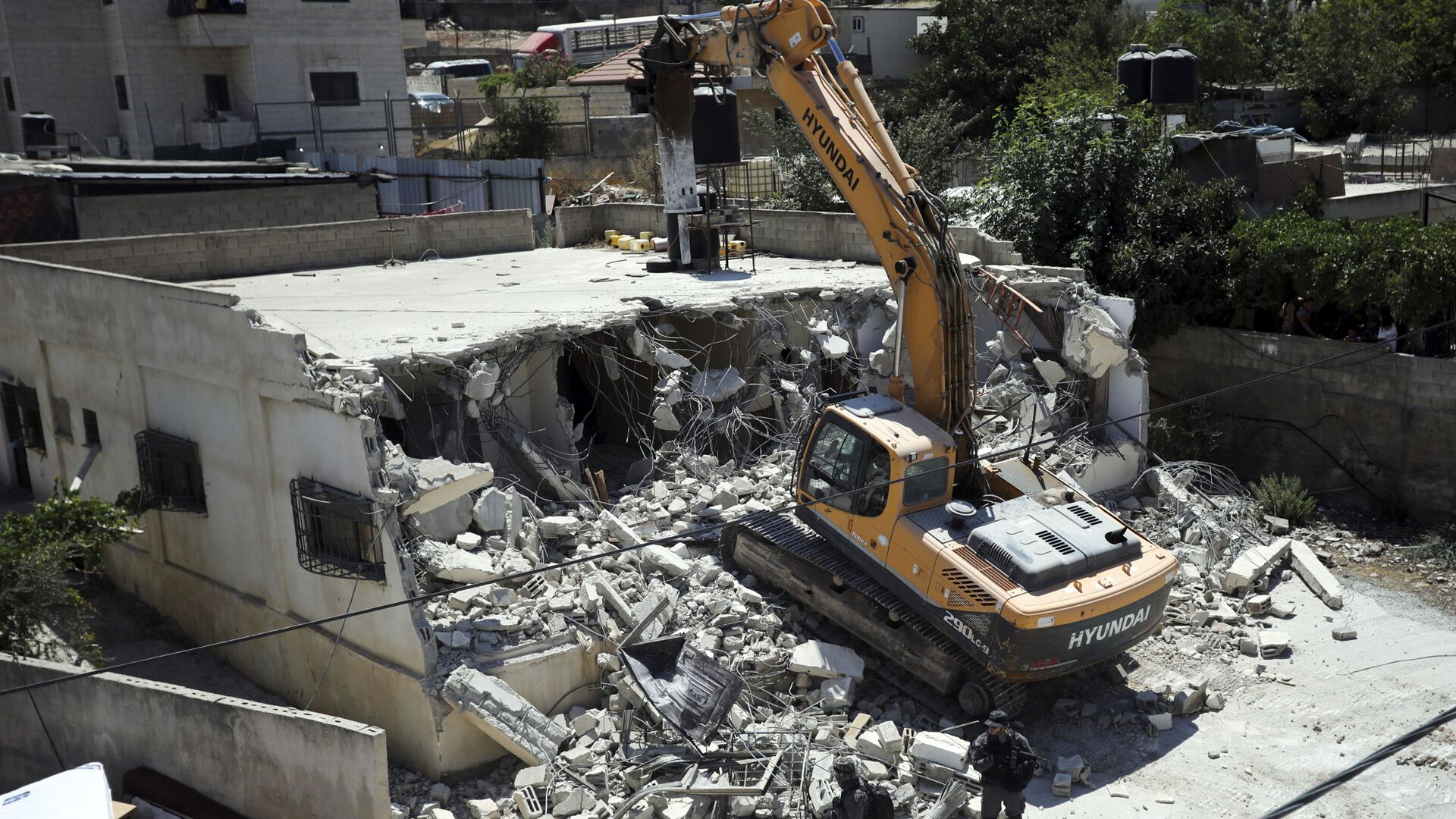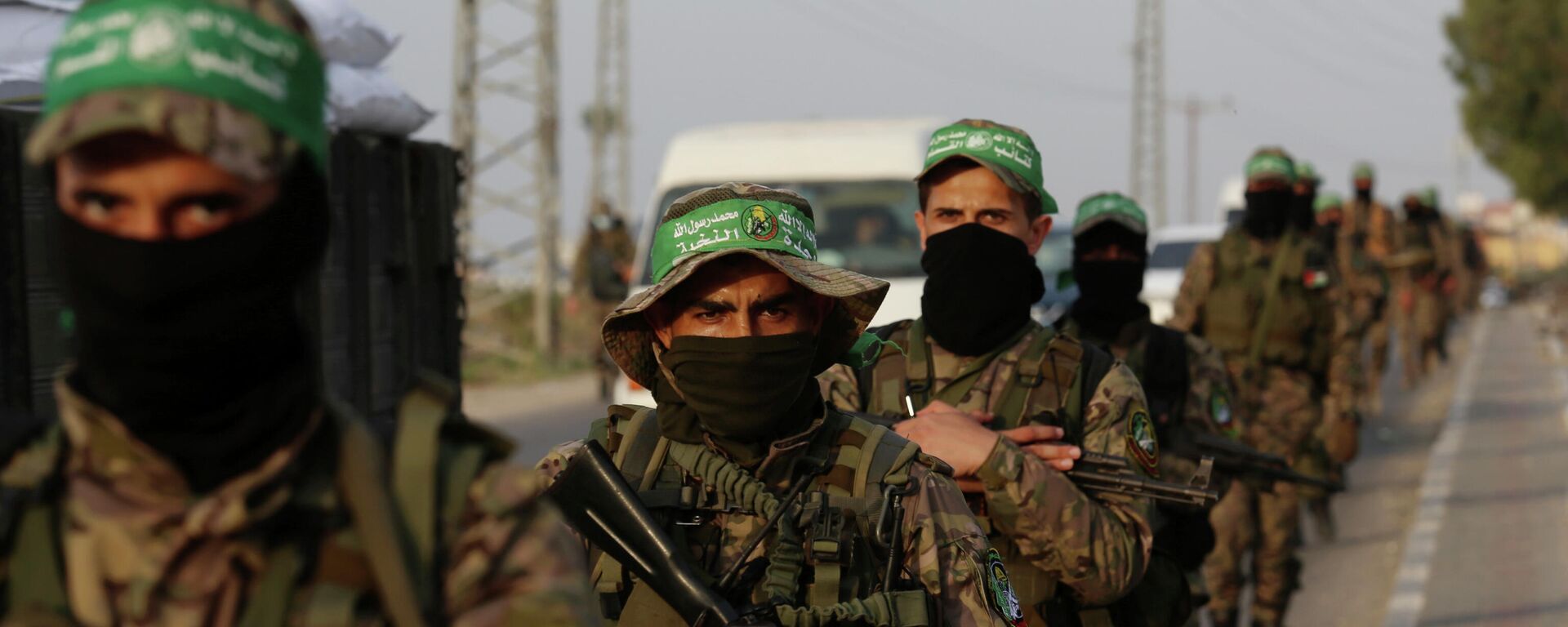https://sputnikglobe.com/20220727/with-biden-visit-done-israel-pushes-ahead-on-approving-1400-housing-units-in-east-jerusalem-1097867104.html
With Biden Visit Done, Israel Pushes Ahead on Approving 1,400 Housing Units in East Jerusalem
With Biden Visit Done, Israel Pushes Ahead on Approving 1,400 Housing Units in East Jerusalem
Sputnik International
In 2017, then-US President Donald Trump, who owed his electoral success to winning over evangelical pro-Israel right-wing voters, recognized Israel’s claim... 27.07.2022, Sputnik International
2022-07-27T20:37+0000
2022-07-27T20:37+0000
2023-01-15T17:26+0000
jerusalem
east jerusalem
palestinians
west bank settlements
israel
https://cdn1.img.sputnikglobe.com/img/07e4/0b/05/1081024421_0:46:3072:1774_1920x0_80_0_0_7640a2ab2afa96ac0006fe5309526b1d.jpg
The Israeli Jerusalem Municipality has pushed forward plans for 1,400 new settlement units in East Jerusalem that would divide Palestinian neighborhoods from one another, settlement watchdog group Peace Now said on Monday.The new settlements would span across the Green Line, which demarcated the 1949 armistice boundary and forms the internationally recognized eastern border of Israel, and into the West Bank. It includes 750 homes in Givat Hamatos, a settlement for Mizrahi and Ethiopian Jews, which will be on land taken from the Palestinian neighborhood of Beit Safafa. The others will stretch eastward toward Sur Baher, another Palestinian neighborhood, as part of the so-called “Lower Aqueduct Plan.”“Politically, this is a strategic plan that will strike a blow at the possibility of a Palestinian urban continuum in East Jerusalem,” Peace Now said. “The plan actually blocks the last remaining corridor to connect Beit Safafa and Shorafat with the rest of East Jerusalem.”Since Israel seized the city in 1967 and subsequently annexed it, Israel has approved 12 new settlements for Jews in the city and built more than 57,000 new homes, while it has approved just 600 homes for Palestinians and not a single new Palestinian neighborhood in the city. Israel claims the city as its capital, based on its status at the center of the ancient Hasmonean Kingdom, which was destroyed by the Roman Empire in 37 BCE.The Palestinians also claim East Jerusalem as the capital of a future Palestinian state, although increased Jewish settlement has increasingly both pushed Palestinians out of the city and cut off access between the city and the West Bank, as the most recent proposal would also do.These aren’t the only settlement expansions recently approved, either: in May, Israel approved 1,600 new housing units in East Jerusalem’s Givat Shapira neighborhood, and plans for more than 4,000 in the West Bank have been pushed ahead. Thousands more in both regions were approved last year, drawing condemnation from Washington.The plan for the 1,400 new homes was first proposed in December but was put on hold when US President Joe Biden, who opposes Israeli settlement beyond the Green Line, visited Israel earlier this month. Biden’s visit, however, was aimed at shoring up support in Jerusalem and Riyadh for US policy against Iran and lowering oil prices, not at securing peace between the Israelis and Palestinians. When Biden visited Ramallah to meet with Palestinian National Authority President Mahmoud Abbas, he was greeted by protests claiming he was “ignoring the Palestinian issue.”Separately, plans have moved ahead to build a synagogue for Yemenite Mizrahi Jews in Silwan, a Palestinian neighborhood in East Jerusalem under heavy pressure to be totally evicted in favor of Jewish settlement.The United Nations does not recognize Israel’s claims over East Jerusalem and has denounced its control over the city and the surrounding West Bank as an occupation and the Jewish settlements built there after 1967 as illegal. Despite the condemnation, Israel has pushed ahead with its settlement programs, allowing roughly 430,000 Jews to build settlements in the West Bank since 1967.
https://sputnikglobe.com/20220725/another-swap-deal-between-israel--hamas-1097758525.html
jerusalem
east jerusalem
israel
Sputnik International
feedback@sputniknews.com
+74956456601
MIA „Rossiya Segodnya“
2022
Sputnik International
feedback@sputniknews.com
+74956456601
MIA „Rossiya Segodnya“
News
en_EN
Sputnik International
feedback@sputniknews.com
+74956456601
MIA „Rossiya Segodnya“
Sputnik International
feedback@sputniknews.com
+74956456601
MIA „Rossiya Segodnya“
jerusalem, east jerusalem, palestinians, west bank settlements, israel
jerusalem, east jerusalem, palestinians, west bank settlements, israel
With Biden Visit Done, Israel Pushes Ahead on Approving 1,400 Housing Units in East Jerusalem
20:37 GMT 27.07.2022 (Updated: 17:26 GMT 15.01.2023) In 2017, then-US President Donald Trump, who owed his electoral success to winning over evangelical pro-Israel right-wing voters, recognized Israel’s claim that Jerusalem is its capital. The move drew international condemnation, but Washington vetoed a UN resolution against it, and US President Joe Biden has shown no signs of changing course.
The Israeli Jerusalem Municipality has pushed forward plans for 1,400 new settlement units in East Jerusalem that would divide Palestinian neighborhoods from one another, settlement watchdog group
Peace Now said on Monday.
The new settlements would span across the Green Line, which demarcated the 1949 armistice boundary and forms the internationally recognized eastern border of Israel, and into the West Bank. It includes 750 homes in Givat Hamatos, a settlement for Mizrahi and Ethiopian Jews, which will be on land taken from the Palestinian neighborhood of Beit Safafa. The others will stretch eastward toward Sur Baher, another Palestinian neighborhood, as part of the so-called “Lower Aqueduct Plan.”
“Politically, this is a strategic plan that will strike a blow at the possibility of a Palestinian urban continuum in East Jerusalem,” Peace Now said. “The plan actually blocks the last remaining corridor to connect Beit Safafa and Shorafat with the rest of East Jerusalem.”
Khalil Tafakji, a leading Palestinian expert on Israeli settlement in Jerusalem,
told The New Arab that “It also follows the Israeli plan of increasing Jerusalem's Jewish population to reach an 88% Jewish majority.”
Since Israel seized the city in 1967 and subsequently annexed it, Israel has approved 12 new settlements for Jews in the city and built more than 57,000 new homes, while it has approved just 600 homes for Palestinians and not a single new Palestinian neighborhood in the city. Israel claims the city as its capital, based on its status at the center of the ancient Hasmonean Kingdom, which was destroyed by the Roman Empire in 37 BCE.
The Palestinians also claim East Jerusalem as the capital of a future Palestinian state, although increased Jewish settlement has increasingly both pushed Palestinians out of the city and cut off access between the city and the West Bank, as the most recent proposal would also do.
These aren’t the only settlement expansions recently approved, either: in May, Israel approved
1,600 new housing units in East Jerusalem’s Givat Shapira neighborhood, and
plans for more than 4,000 in the West Bank have been pushed ahead. Thousands more in both regions were approved last year,
drawing condemnation from Washington.
The plan for the 1,400 new homes
was first proposed in December but was put on hold when US President Joe Biden, who opposes Israeli settlement beyond the Green Line, visited Israel earlier this month. Biden’s visit, however, was aimed at shoring up support in Jerusalem and Riyadh
for US policy against Iran and lowering oil prices, not at securing peace between the Israelis and Palestinians. When Biden visited Ramallah to meet with Palestinian National Authority President Mahmoud Abbas,
he was greeted by protests claiming he was “ignoring the Palestinian issue.”
Separately, plans have moved ahead to build a synagogue for Yemenite Mizrahi Jews in Silwan, a Palestinian neighborhood in East Jerusalem under heavy pressure to be totally evicted in favor of Jewish settlement. The United Nations does not recognize Israel’s claims over East Jerusalem and has denounced its control over the city and the surrounding West Bank as an occupation and the Jewish settlements built there after 1967 as illegal. Despite the condemnation, Israel has pushed ahead with its settlement programs, allowing
roughly 430,000 Jews to build settlements in the West Bank since 1967.


